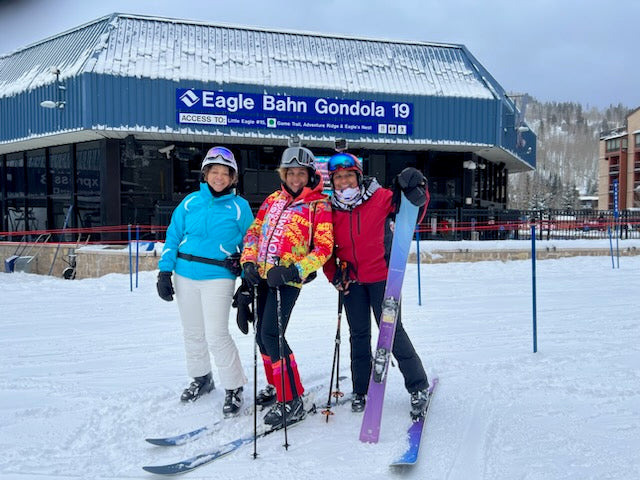The snow-capped mountains, the thrill of gliding down slopes, and the cozy après-ski scenes – a ski trip promises an unforgettable adventure for first-timers and seasoned skiers alike. If you're gearing up for your first ski trip, careful planning is key to ensuring a smooth and enjoyable experience. From choosing the right destination to packing the essentials, here's your ultimate guide to planning a memorable first ski trip:
**1. Choose the Perfect Destination:**
Selecting the right ski resort sets the tone for your entire trip. Look for resorts that cater to beginners with gentle slopes, dedicated learning areas, and patient instructors. Popular beginner-friendly destinations include Aspen, Colorado; Lake Tahoe, California; and Whistler, British Columbia. Research the resort's amenities, ski school options, and overall ambiance to find the best fit for your preferences.
**2. Book Accommodation in Advance:**
Once you've chosen your destination, book your accommodation well in advance. Ski resorts can get busy, especially during peak season, so securing a comfortable place to stay is crucial. Many resorts offer ski-in, ski-out accommodations for easy access to the slopes, while others provide shuttles to the lifts.
**3. Invest in Quality Lessons:**
Enrolling in ski lessons is a must for first-timers. Qualified instructors can teach you the basics of skiing, from putting on your gear to controlling your speed and making turns. Group lessons are great for socializing with other beginners, while private lessons offer personalized attention and a tailored learning experience.
**4. Rent or Buy Gear:**
For your first ski trip, consider renting ski equipment. Most resorts have rental shops that offer well-maintained skis, boots, and poles. As a beginner, renting allows you to get a feel for the equipment and understand your preferences before investing in your own gear.
**5. Dress in Layers:**
Dressing appropriately for the cold is crucial. Wear moisture-wicking base layers to keep sweat away from your skin, followed by insulating layers for warmth. A waterproof and windproof outer layer is essential to protect you from the elements. Don't forget warm gloves, a hat, and goggles to shield your eyes from the sun and snow glare.
**6. Plan for Après-Ski Activities:**
Skiing is just part of the experience – après-ski activities add to the fun. Whether it's enjoying a hot chocolate by the fire, exploring the resort village, or indulging in spa treatments, plan some downtime to relax and unwind after your time on the slopes.
**7. Stay Hydrated and Nourished:**
Skiing is physically demanding, so staying hydrated and fueling your body with nutritious food is essential. Carry a reusable water bottle and snack on energy-rich foods to keep your energy levels up throughout the day.
**8. Be Patient and Have Fun:**
Learning to ski takes time and practice, so be patient with yourself. Embrace the learning process, celebrate small victories, and remember that everyone starts as a beginner. Most importantly, have fun! Skiing is not just about mastering the sport – it's about enjoying the breathtaking scenery, bonding with friends and family, and creating lasting memories.
In conclusion, planning your first ski trip involves a combination of research, preparation, and enthusiasm. By selecting the right destination, taking lessons, dressing appropriately, and embracing the experience, you're setting yourself up for a thrilling adventure that will leave you with a newfound love for the slopes. So, pack your bags, gear up, and get ready to embark on a ski trip you'll cherish for years to come.
**1. Choose the Perfect Destination:**
Selecting the right ski resort sets the tone for your entire trip. Look for resorts that cater to beginners with gentle slopes, dedicated learning areas, and patient instructors. Popular beginner-friendly destinations include Aspen, Colorado; Lake Tahoe, California; and Whistler, British Columbia. Research the resort's amenities, ski school options, and overall ambiance to find the best fit for your preferences.
**2. Book Accommodation in Advance:**
Once you've chosen your destination, book your accommodation well in advance. Ski resorts can get busy, especially during peak season, so securing a comfortable place to stay is crucial. Many resorts offer ski-in, ski-out accommodations for easy access to the slopes, while others provide shuttles to the lifts.
**3. Invest in Quality Lessons:**
Enrolling in ski lessons is a must for first-timers. Qualified instructors can teach you the basics of skiing, from putting on your gear to controlling your speed and making turns. Group lessons are great for socializing with other beginners, while private lessons offer personalized attention and a tailored learning experience.
**4. Rent or Buy Gear:**
For your first ski trip, consider renting ski equipment. Most resorts have rental shops that offer well-maintained skis, boots, and poles. As a beginner, renting allows you to get a feel for the equipment and understand your preferences before investing in your own gear.
**5. Dress in Layers:**
Dressing appropriately for the cold is crucial. Wear moisture-wicking base layers to keep sweat away from your skin, followed by insulating layers for warmth. A waterproof and windproof outer layer is essential to protect you from the elements. Don't forget warm gloves, a hat, and goggles to shield your eyes from the sun and snow glare.
**6. Plan for Après-Ski Activities:**
Skiing is just part of the experience – après-ski activities add to the fun. Whether it's enjoying a hot chocolate by the fire, exploring the resort village, or indulging in spa treatments, plan some downtime to relax and unwind after your time on the slopes.
**7. Stay Hydrated and Nourished:**
Skiing is physically demanding, so staying hydrated and fueling your body with nutritious food is essential. Carry a reusable water bottle and snack on energy-rich foods to keep your energy levels up throughout the day.
**8. Be Patient and Have Fun:**
Learning to ski takes time and practice, so be patient with yourself. Embrace the learning process, celebrate small victories, and remember that everyone starts as a beginner. Most importantly, have fun! Skiing is not just about mastering the sport – it's about enjoying the breathtaking scenery, bonding with friends and family, and creating lasting memories.
In conclusion, planning your first ski trip involves a combination of research, preparation, and enthusiasm. By selecting the right destination, taking lessons, dressing appropriately, and embracing the experience, you're setting yourself up for a thrilling adventure that will leave you with a newfound love for the slopes. So, pack your bags, gear up, and get ready to embark on a ski trip you'll cherish for years to come.

